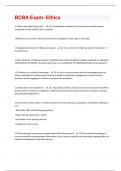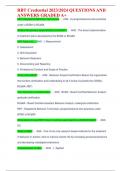BCBA Exam - Ethics 1. What is the right thing to do? - -Considerations related to cultural practices: what may be acceptable in one culture is not in another -Differences across time: what may have been acceptable 20 years ago is not today 1.0 Responsible Conduct of Behavior Analysts - -You maintain the high standards of behavior of the profession. -Code's Definition of Behavior Analyst: individual who holds the BCBA or BCaBA credential, an individual authorized by the BACB to provide supervision, or a coordinator of a BACB Approved Course Sequence 1.01 Reliance on Scientific Knowledge - You rely on professionally derived knowledge based on science and behavior analysis when making scientific or professional judgments in human service provision, when engaging in scholarly or professional endeavors 1.02 Boundaries of Competence - - You provide services, teach, and conduct research only within the boundaries of of your competence, defined as being commensurate with your education, training, and supervised experience. -You provide services, teach, or conduct research in new areas (e.g., populations, techniques, behaviors, etc.) -Only after FIRST undertaking appropriate study, training, supervision, and/or consultation from persons who are competent in those areas 1.03 Maintaining Competence through Professional Development - You maintain knowledge of current scientific and professional information in your areas of practice and undertake ongoing efforts to maintain competence in the skills you use. 1.04 Integrity - 1. You are truthful and honest and arrange the environment to promote truthful and honest behavior in others. 2. You do not implement contingencies that would cause others to engage in fraudulent, illegal, or unethical conduct. 3. You follow through on obligations and contractual and professional commitments with high quality work and refrain from making professional commitments you cannot keep. 4. Your behavior conforms to the legal and ethical codes of the social and professional community of which you are a member. 5. If your ethical responsibilities conflict with law or any policy on an organization with which you are affiliated, you make known your commitment to this Code and take steps to resolve the conflict in a responsible manner in accordance with law. 1.05 Professional and Scientific Relationships - 1. You provide behavior -analytic services only in the context of a defined, professional, or scientific relationship or role. 2. When you provide behavior -analytic services, you use language that is fully understandable to the recipient of those services while remaining conceptually systematic with the profession of behavior analysis. Provide appropriate information PRIOR to serv ice delivery about the nature of such services and appropriate information later about results and conclusions. 3. If differences of age, gender, race, culture, ethnicity, national origin, religion, sexual orientation, disability, language, or socioeconomic status significantly affect your work concerning particular individuals or groups, you obtain the training, ex perience, consultation, and/or supervision necessary to ensure the competence of your services, or make appropriate referrals. 4. In your work -related activities, you do not engage in discrimination against individuals or groups based on age, gender, race, culture, ethnicity, national origin, religion, sexual orientation, disability, language, or socioeconomic status, in accordanc e with law. 5. You do not knowingly engage in behavior that is harassing or demeaning to persons with whom you interact in your work based on factors, such as those persons' age, gender, race, culture, ethnicity, national origin, religion, sexual orientation, disabili ty, language, or socioeconomic status, in accordance with law. 6. You recognize that your personal problems and conflicts may interfere with your effectiveness. You refrain from providing services when your personal circumstances may compromise delivering services to the best of your abilities. 1.06 Multiple Relationships and Conflicts of Interest - 1. Due to the potentially harmful effects of multiple relationships, you avoid multiple relationships. -Code's definition of Multiple Relationships: behavior analyst is in both a behavior - analytic role and a non -behavior -analytic role simultaneously with a client or someone closely associated with or related to the client 2. You must always be sensitive to the potentially harmful effects of multiple relationships. If you find that, due to unforeseen factors, a multiple relationship has arisen, you seek to resolve it. 3. You recognize and inform clients and supervisees about the potential harmful effects of multiple relationships. 4. You do not accept any gifts from or give any gifts to clients because this constitutes a multiple relationship. 1.07 Exploitative Relationships - 1. You do not exploit persons over whom you have supervisory, evaluative, or other authority such as STUDENTS, SUPERVISEES, employees, research participants, and CLIENTS. -Code's Definition of Student: individual who is matriculated at a college/university; code applies to the student during formal behavior -analytic instruction -Code's Definition of Supervisee: any individual whose behavior -analytic services are overseen by a behavior analyst within the context of a defined, agreed -upon relationship -Code's Definition of Client: any recipient or beneficiary of the professional services provided by a behavior analyst (for purposes of this definition, the term client does NOT include third -party insurers or payers, unless you are hired directly under contract by the third -party insurer or payer 2. You do not engage in sexual relationships with clients, students, or supervisees, because such relationships easily impair judgment or become exploitative. 3. You must refrain from any sexual relationships with client, students, or supervisees at least 2 years after the date that the professional relationship has formally ended. 4. You do not barter for services, unless a written agreement is in place for the barter that is: 1. Requested by the client or supervisee 2. Customary to the area where services are provided, and 3. Fair and commensurate with the value of behavior -analytic services provided 10.0 Behavior Analysts' Ethical Responsibility to the BACB - You must adhere to this Code and all rules and standards of the BACB





